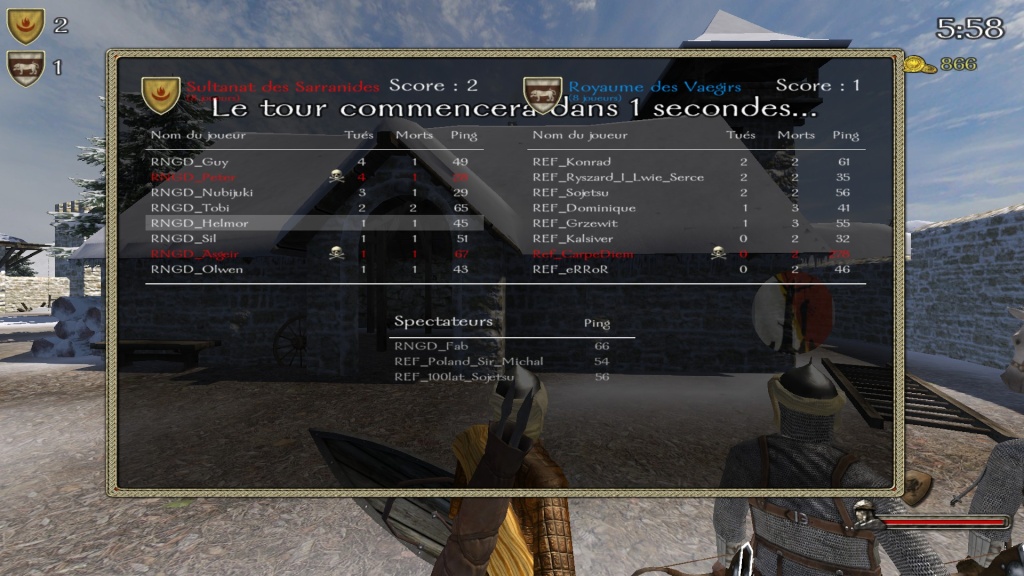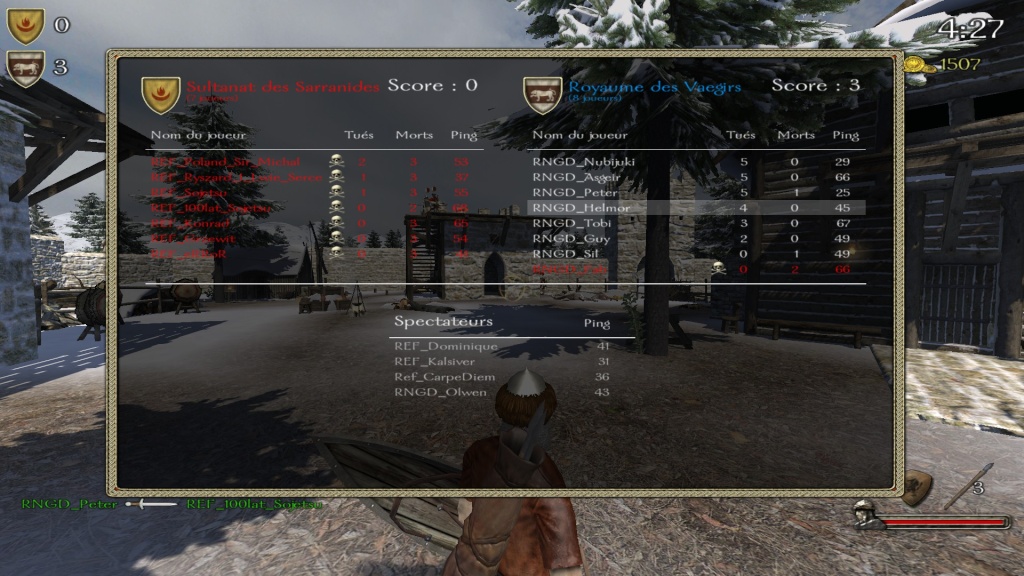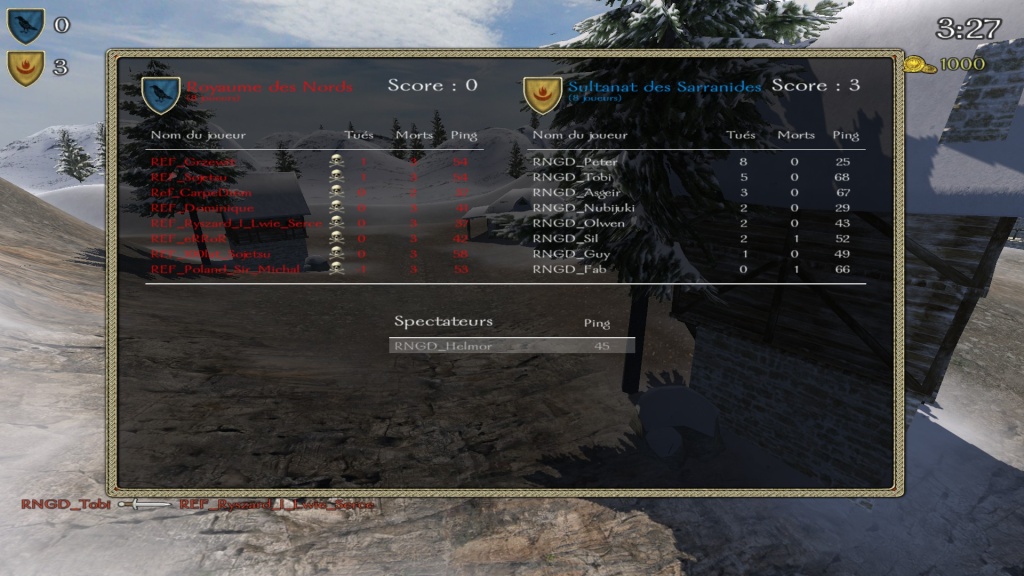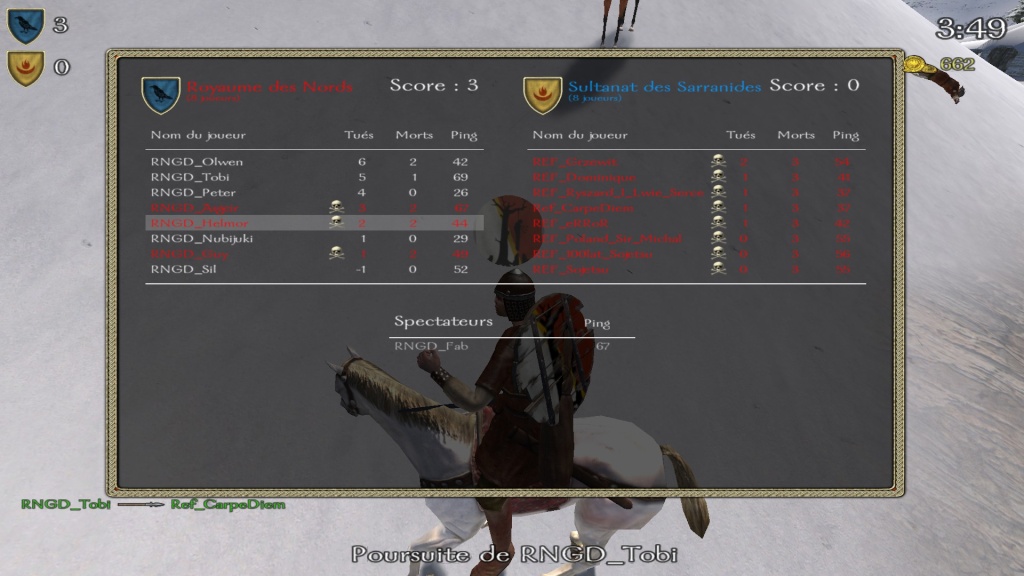It has like everything. Number of players + number of rounds = current situation in game. Every round and player are more precious now than before.captain lust said:This has nothing to do with the number of players. This is about the number of rounds.Wezyk said:It changes it simply. In a match with RRush on Vendetta both teams were trynig to keep some areas and they were aware that every flanking manouver increases a risk to lose a round. In 8vs8 every players counts as gold for a team not like in 10 vs 10. Loosing one or two player causes being defensive for the team with low amount of players and that's the fact not just an opinion.
- Home
- Forums
- The Realm
- Tournaments & Events
- Mount & Blade: Warband
- Completed
- [ENL] European Native League
You are using an out of date browser. It may not display this or other websites correctly.
You should upgrade or use an alternative browser.
You should upgrade or use an alternative browser.
WTFFS - Round 2 Fixtures | Deadline 10/02/2012
- Thread starter captain lust
- Start date
Users who are viewing this thread
Total: 2 (members: 0, guests: 2)
I'm certainly not arguing that fewer players leads to more risk/reward and whether that's a good or bad thing is a separate discussion.Wezyk said:It has like everything. Number of players + number of rounds = current situation in game. Every round and player are more precious now than before.captain lust said:This has nothing to do with the number of players. This is about the number of rounds.Wezyk said:It changes it simply. In a match with RRush on Vendetta both teams were trynig to keep some areas and they were aware that every flanking manouver increases a risk to lose a round. In 8vs8 every players counts as gold for a team not like in 10 vs 10. Loosing one or two player causes being defensive for the team with low amount of players and that's the fact not just an opinion.
However, when it comes to rounds I just don't see the connection. Teams will do what it takes to win at 12 or 200 rounds. If a tactic is bad, it's bad whenever and the number of rounds won't change that.
But they will do it slighty different right ? When you lost 3 rounds you aren't so eager to attack or lose one of your players because it's 1/3 of the overall rounds and you must be careful! That leads to very defensive tactics. Another argument, if you have 12 rounds that means that every rounds is precious. Furthermore you have 8vs8 and if you lose one player it leads to greater chance for the opposite team to win that round. As it's only 12 rounds you must be careful in every round which leads not to attacking but just being defensivecaptain lust said:I'm certainly not arguing that fewer players leads to more risk/reward and whether that's a good or bad thing is a separate discussion.Wezyk said:It has like everything. Number of players + number of rounds = current situation in game. Every round and player are more precious now than before.captain lust said:This has nothing to do with the number of players. This is about the number of rounds.Wezyk said:It changes it simply. In a match with RRush on Vendetta both teams were trynig to keep some areas and they were aware that every flanking manouver increases a risk to lose a round. In 8vs8 every players counts as gold for a team not like in 10 vs 10. Loosing one or two player causes being defensive for the team with low amount of players and that's the fact not just an opinion.
However, when it comes to rounds I just don't see the connection. Teams will do what it takes to win at 12 or 200 rounds. If a tactic is bad, it's bad whenever and the number of rounds won't change that.
Playing defensive doesn't mean you won't lose the round. What are you talking about?
If a team rushes, they do it because they think it will give them a better chance of winning - not because "it's 20 rounds and hey who gives a **** if we lose this one?". It's no more risky than camping, the risk is just more immediate.
If a team rushes, they do it because they think it will give them a better chance of winning - not because "it's 20 rounds and hey who gives a **** if we lose this one?". It's no more risky than camping, the risk is just more immediate.
I think makes BaronDeMoroz a quite good assessment of the proposed rules here: http://forums.taleworlds.com/index.php/topic,215244.msg5173099.html#msg5173099
Having fewer players means that the importance of a single player rises.
If 100 players are fighting per team (not likely, just for the sake of this premise), one player would make up 1% of the team. If ten players are fighting, one player would make up 10% of his team. And if eight players are fighting, one player makes up 12,5% of his team. Obviously the person making tactical decisions will think about the risk involved in any action. If he had 100 players at that start, he could lose 10 players and retain the same percentage of players as a commander with a starting number of ten losing one player.
The commander with only eight players at the beginning of the round would lose more in terms of percentage when he loses one player, when compared to the commander of the 100 player team losing ten. If the team loses three players (37,5%) without making the enemy lose an equal amount (or more), any tactics risking the loss of these 37,5% could become game-changing with this number of players, as it would leave five players fighting eight.
If it is likely that these three players would be able to seriously hurt the other team, the commander would split them from the main group nonetheless. But, as both teams are likely to watch the other team before making such a decision, that means they will probably play defensively at the beginning of the round until they can see how the round develops. Here the round time comes into play, as probably one minute or more of the available time will have gone by. As BaronDeMoroz argued in the linked post, why risk anything if it is likely that the flags will spawn within few minutes? Even if no players are lost, sending them away from the flag spawns or splitting them up could make fighting around the flags much harder, so keeping the team together at a place from where all/most of the flags can be accessed seems the sensitive solution for a commander who is not interested in risking losing the round. That would essentially mean camping.
It had also been argued that fewer rounds mean that individual rounds are more important. That means commanders (and teams of course) are more interested in winning every round and will play accordingly. I have seen a lot of overly defensive play (camping in matches) work, but have seldom seen overly aggressive play work as good. Coordinating and directing a group on the move is harder then in a fixed location and hence the chance of error (becoming split up, some people lagging behind) becomes greater. Imagine a group of four infantry crossing an open space in a formation that is not entirely cohesive and prepared to repel both archer fire and cavalry charges. It can be pulled of, but it is more risky to do then just camping. That is not to say that camping is not risky, but aggressive play is imo more risky. I am also unsure if "risky" is the right term in this case. Even if we assume that defensive and aggressive play are both equally as risky, I still would expect people to play defensively under these circumstances and only aggressively if they are inexperienced and not prepared or very experienced and meticulously prepared. Because I'd say that playing aggressively seems, more risky then defensively - regardless of whether it is or not. My experience has been that teams play aggressively if they can afford to lose some players, which - as argued before - they can't really in an 8v8 match.
In short:
- The fewer players there are in a team, the more each individual player is important for the chance to win
- The less time there is, the more important is quickly assessing what the situation is and what should be done. Due to the limited time available and the limited number of players, commanders are likely to use less risky tactics
- The fewer rounds there are in a match, the more each rounds is important for winning the match. Hence risky tactics that could lead to losing the match are less likely to be used
- Camping is in my opinion not a very risky tactic (presuming the team stays alert and ready to react to tactics of the opponent), so even when it might not be the ideal tactic for winning, I believe commanders would use it due to it's inherent defensive nature
Having fewer players means that the importance of a single player rises.
If 100 players are fighting per team (not likely, just for the sake of this premise), one player would make up 1% of the team. If ten players are fighting, one player would make up 10% of his team. And if eight players are fighting, one player makes up 12,5% of his team. Obviously the person making tactical decisions will think about the risk involved in any action. If he had 100 players at that start, he could lose 10 players and retain the same percentage of players as a commander with a starting number of ten losing one player.
The commander with only eight players at the beginning of the round would lose more in terms of percentage when he loses one player, when compared to the commander of the 100 player team losing ten. If the team loses three players (37,5%) without making the enemy lose an equal amount (or more), any tactics risking the loss of these 37,5% could become game-changing with this number of players, as it would leave five players fighting eight.
If it is likely that these three players would be able to seriously hurt the other team, the commander would split them from the main group nonetheless. But, as both teams are likely to watch the other team before making such a decision, that means they will probably play defensively at the beginning of the round until they can see how the round develops. Here the round time comes into play, as probably one minute or more of the available time will have gone by. As BaronDeMoroz argued in the linked post, why risk anything if it is likely that the flags will spawn within few minutes? Even if no players are lost, sending them away from the flag spawns or splitting them up could make fighting around the flags much harder, so keeping the team together at a place from where all/most of the flags can be accessed seems the sensitive solution for a commander who is not interested in risking losing the round. That would essentially mean camping.
It had also been argued that fewer rounds mean that individual rounds are more important. That means commanders (and teams of course) are more interested in winning every round and will play accordingly. I have seen a lot of overly defensive play (camping in matches) work, but have seldom seen overly aggressive play work as good. Coordinating and directing a group on the move is harder then in a fixed location and hence the chance of error (becoming split up, some people lagging behind) becomes greater. Imagine a group of four infantry crossing an open space in a formation that is not entirely cohesive and prepared to repel both archer fire and cavalry charges. It can be pulled of, but it is more risky to do then just camping. That is not to say that camping is not risky, but aggressive play is imo more risky. I am also unsure if "risky" is the right term in this case. Even if we assume that defensive and aggressive play are both equally as risky, I still would expect people to play defensively under these circumstances and only aggressively if they are inexperienced and not prepared or very experienced and meticulously prepared. Because I'd say that playing aggressively seems, more risky then defensively - regardless of whether it is or not. My experience has been that teams play aggressively if they can afford to lose some players, which - as argued before - they can't really in an 8v8 match.
In short:
- The fewer players there are in a team, the more each individual player is important for the chance to win
- The less time there is, the more important is quickly assessing what the situation is and what should be done. Due to the limited time available and the limited number of players, commanders are likely to use less risky tactics
- The fewer rounds there are in a match, the more each rounds is important for winning the match. Hence risky tactics that could lead to losing the match are less likely to be used
- Camping is in my opinion not a very risky tactic (presuming the team stays alert and ready to react to tactics of the opponent), so even when it might not be the ideal tactic for winning, I believe commanders would use it due to it's inherent defensive nature
captain lust said:Playing defensive doesn't mean you won't lose the round. What are you talking about?
If a team rushes, they do it because they think it will give them a better chance of winning - not because "it's 20 rounds and hey who gives a **** if we lose this one?". It's no more risky than camping, the risk is just more immediate.
Or
"It's 20 rounds and hey if we lose this one we haven't lost the entire match."
RNGD 11 - 1 REF








GG ref, it was a pleasant match and sorry again for being late.
I really like 8 vs 8, it allows to players a better global vue of the match and get the Team speak much more quiet
PS : I just remember that this round was without class limit and it was pretty much more pleasant to play. But as i remember i never got more than 5 peoples using the same class then perhaps a class limit to 5 would be good ?
I really like 8 vs 8, it allows to players a better global vue of the match and get the Team speak much more quiet
PS : I just remember that this round was without class limit and it was pretty much more pleasant to play. But as i remember i never got more than 5 peoples using the same class then perhaps a class limit to 5 would be good ?
Sir_Michal
Squire

GG RNGD, that was good match.
In my opinion:
8 v 8
Really like this change. If both teams want to play 10vs10 they play, so really I can't see any problem there.
12 Rounds
Matches are too fast. 16 rounds or 20 as normal, will be great. Ok, we play matches now in ~40 minutes. But why? It's a problem to play ~1h30min for 20 rounds of good fun? Not really.
Reduced gold bonus:
As David said:
5 min round limit
It's ok. When you play big battle it's good idea to increase round time. And when we play 8vs8 we should reduce it.
In my opinion:
8 v 8
Really like this change. If both teams want to play 10vs10 they play, so really I can't see any problem there.
12 Rounds
Matches are too fast. 16 rounds or 20 as normal, will be great. Ok, we play matches now in ~40 minutes. But why? It's a problem to play ~1h30min for 20 rounds of good fun? Not really.
Reduced gold bonus:
As David said:
Lord_David said:With 3 rounds there isn't really any time to get armoured tanks unless someone gets a big amount of kills, which is harder with less people. I could understand this if it went up to 4 rounds and would even agree with that but reduced gold with 3 rounds a map is ridiculous in my opinion.
5 min round limit
It's ok. When you play big battle it's good idea to increase round time. And when we play 8vs8 we should reduce it.
captain lust said:If a team charges, it's because they think it will give them a better chance of winning the round. Doing it for any other reason is just moronic and I don't see how that changes with the number of rounds played.
Exactly.
Similar threads
- Replies
- 7
- Views
- 334
- Replies
- 0
- Views
- 39











